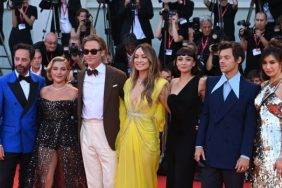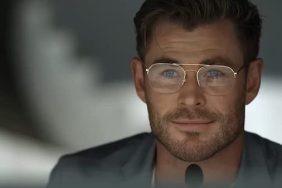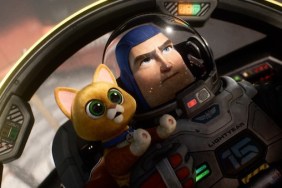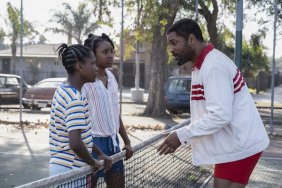All movies jump time to get to the story. We take it for granted that we don’t see the characters get up every morning, brush their teeth, pay their bills, etc. if it’s not relevant to the story. They only film the parts of the story that matter so we jump from morning to evening, location to location, and even sometimes full seasons or years. In Boyhood, the filmmakers literally waited years to film only the important parts of the story. This could have been a precious gimmick but it actually creates a subtle story of a family’s life in which the performers gradually age. No silly old age makeup, no recasting the kids at different ages, it is a complete story that stands on its own, only it was essentially filmed in real time.
By following Mason (Ellar Coltrane) from six to 18, along with his divorced parents (Patricia Arquette and Ethan Hawke) and older sister Samantha (Lorelei Linklater), writer/director Richard Linklater found another way to try to figure out the purpose of it all. As life events happen, characters discuss what it all means, with the parents doing a lot of the heavy talking in the earlier years, but Mason goes full Before Midnight once he’s a teenager.
You can obviously tell Coltrane looks very different by year ten than he did in year one, but as the film progresses the growth is imperceptible. Sometimes there’s a significant hair change, but there’s no overt marker of “now it’s year five!” By the time the kids are talking about General Grievous, I realized, “Wait, it’s 2005 already?” That means the story is working regardless of the 12-year span of filming. You don’t notice what year it is until you hit some major date marker.
There are a lot of cultural landmarks to identify the periods, things as significant as the Iraq War and the midnight release of Harry Potter and the Half-Blood Prince to glimpses at newspaper headlines, viral videos and now-outdated video game consoles. There’s music of course, lots of music, some on the nose (Coldplay? Really?) and some timeless rock. Linklater said after the film that the soundtrack has not been cleared yet, but musicians love Linklater so he’s probably fine. Maybe cut Coldplay though.
The story of Mason and his family ranges from coming of age moments to intense family drama. Mason is a good kid. There’s no major dysfunction, just the usual kids trying to figure out who they want to be. Mason discovers his hormones with innocent ogling of lingerie catalogs, teenage vulgarity, and a sweetness with schoolgirl crushes and young love. I love Samantha. As a toddler, she’s a smart little monster terrorizing her brother.
Linklater has a great perspective on the way kids observe the adults in their lives. When Mason and Samantha are children, they see their individual parents fight and flirt in the background but the body language is still clear. As they get older, some of Mom’s new relationships become terrifying, but Linklater uses clear visual language to show us what kind of man Mom has brought into their lives, without heavy handedness. At one point, we only learn what Mason’s new stepdad does for a living when he turns around and we read the back of his uniform. It’s not a plot point, just a character detail.
The parents speak intellectually to the children. Of course they do in Linklater’s world. They still have the awkward safe sex talk, but when Mason starts speculating on conspiracies of technology, social media and society, it’s clear where he gets it from. Really, all the characters in Linklater films get it from the big daddy himself, but it’s a really admirable family trying to raise good kids and teach them well. It’s not all that deep either. There’s a great passage about the Beatles solo careers along the way too.
The film is nearly three hours but it still tells a concise drama. It’s not sprawling. A movie shot in three months could cover the same ground and might be clunkier about it. It is really unique to watch characters gradually grow up. This is one experimental film that is a total success.

Fred Topel is a staff writer at CraveOnline and the man behind Best Episode Ever and The Shelf Space Awards. Follow him on Twitter at @FredTopel.








